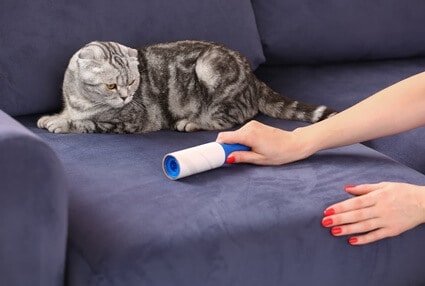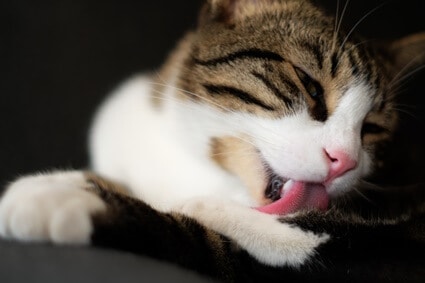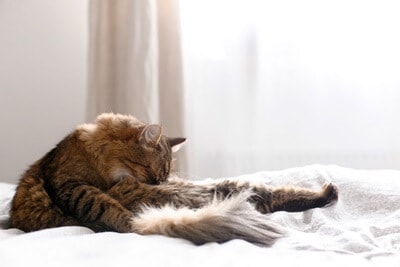Cats have a reputation for being clean animals due to the countless hours they spend grooming. The average cat will spend much of its day cleaning its fur, removing grease, dirt, and debris. The backward-facing barbs (papillae) on a cat’s tongue will also pull out any dead fur, allowing new hair to come through while improving circulation to the skin.
Cats do all they can to stay clean. A cat will regularly groom its fur with sterile saliva to keep its fur clean and unscented. Cats will also bury their waste and clean up after going to the toilet. Of course, a cat will struggle to perform these tasks if it’s old, overweight, or arthritic.
A clean, sleek fur coat that’s free from scent is a sign of a healthy feline. If you care for your cat well, it should be clean and largely undetectable. If your cat looks unkempt or dirty, there will be a reason why.
Are Cats Clean Pets?
Cats are widely considered the cleanest of all domestic pets. That’s because cats are passionate about grooming and self-care, and they loathe feeling dirty or emitting clear and unmistakable scents.
Cats are dedicated to grooming as a survival instinct as they’re mesopredators. They hunt smaller prey but know that they’re not at the top of the food chain. This means that cats like to remain undetectable.
The main way cats achieve this is by grooming themselves. The cleaner a cat is, the less likely it is to release a scent. This, in turn, makes a cat difficult for predators to track. You’ll notice that wild and feral cats often look immaculate.
Unless your cat is old or immobile due to stiff joints, washing your cat will rarely be necessary.
Are Cats Cleaner Than Dogs?
Some dogs are very particular about their grooming and cleanliness. Equally, you may have a rare cat that is indifferent to hygiene. As a rule, cats are cleaner than dogs.
That’s due to the following reasons:
- Cats usually spend more time indoors.
- Dogs are usually larger animals and less concerned about predators.
- Dogs always pee and poop outside, rarely stopping to clean themselves.
Are Cats Cleaner Than Humans?
Based on the amount of time spent grooming, cats are more focused on cleaning than humans. Cats spend up to half their day cleaning themselves, while humans usually limit their showering or bathing once daily or less.
When people shower or bathe, they use a range of cosmetics. Shower gels, soaps, and antiperspirants will keep humans clean and fresh for a long time. Cats need to groom with much greater frequency. While a cat’s saliva is an effective cleaning agent, it has certain limitations.
Humans wear clothing to protect their skin from scents and staining, while a cat’s fur is exposed to the elements.
People brush their teeth once or twice a day, but cats don’t. This means that cats may have food remnants in their mouth. Cats require the assistance of their owners and veterinarians to maintain their oral cleanliness.
How Do Cats Clean Themselves?
A cat’s primary method of staying clean is its saliva.
A cat’s tongue has hollow papillae comparable to a hairbrush. Saliva is trapped within these papillae. The cat will lick its paws, transferring the saliva. The cat will then rub its paws all over itself. In doing so, the saliva is spread evenly.
This serves multiple purposes in keeping a cat clean. Saliva is akin to bathing with water. It may not sound hygienic by human standards, but it works well for a cat. Saliva also cools a cat down on a hot day, preventing it from overheating and sweating.
This saliva evenly distributes oils on a cat’s fur. This means that skin oils cannot build up in one location. If this occurs, a cat’s fur starts to look matted and greasy. Also, the cat would start to produce an odor.
Healthy cats rarely lose interest in staying clean. If it’s stopped grooming, your cat is likely sick or physically incapable of grooming due to obesity, cognitive decline, or a degenerative joint condition.

How Clean are Cats’ Mouths?
Cats don’t brush their teeth, which means that food will rot. The build-up of bacteria could cause gum disease and tooth loss in cats.
To minimize the bacteria in a cat’s mouth, brush its teeth regularly. A cat’s teeth should be brushed with feline-specific toothpaste once per week. Of course, most cats will resist this practice, at least initially.
How Clean Are Cats’ Tongues?
A cat’s tongue is covered in tiny bristles, called papillae, which trap all manner of foreign objects.
If a cat hunts rodents/birds, bacteria and germs will remain trapped on the papillae. This means that a cat’s tongue is unlikely to be clean. Avoid letting a cat lick any open cuts.
Are Cats Clean After Pooping?
Cats are careful to clean up after elimination.
When a cat poops, it will bury any waste in the litter. This is a survival instinct, similar to the act of grooming. The cat does not want a predator to know it was nearby, and any poop/urine remnants can be an obvious giveaway.
If a cat has a healthy diet, it should release firm stools, which will require limited cleaning afterward. The cat will clean its own bottom using its tongue, which is unhygienic.
If you notice dry feces around your cat’s bottom, clean off any sticky or dried residue. The cat’s strong sense of smell will detect the waste and run around the home, trying to shake/rub it off.
Dirty bottoms in cats are hazardous. As per the Journal of Parasitology, cats can shed Toxoplasma gondii cysts in waste, leading to toxoplasmosis.
How To Keep Cats Clean
Cats look after their own cleaning needs. There may come times that you need to step in, especially if you have a senior cat. If your cat has had surgery or is unwell, it may need assistance with staying clean.
Managing Weight
Keeping your cat’s weight under control is key to keeping it clean.
If your cat carries excess weight, it’ll struggle to groom because it cannot contort sufficiently. This leads to dirt becoming trapped in the fur. Your cat will also struggle to clean itself after elimination.
The standard weight for a house cat is circa 10 lbs. This doesn’t take into account the breed of the cat, though. A large cat, such as the Maine Coon, can weigh up to 18 lbs, while a Munchkin cat should weigh under 10 lbs.
You’ll always be able to tell if your cat is overweight. If the cat cannot clean itself, it’ll stop trying. This will lead to messy, dirty, and unkempt fur. The cat may also have a messy bottom.
Your cat will need to lose weight as this reduces the risk of diabetes or heart disease while restoring a cat’s ability to clean itself. Restricting food intake remains the most impactful way to achieve this goal. So, substitute food for other activities that bring pleasure, such as play.
Enhancing Mobility
As your cat grows older, arthritis becomes increasingly likely.
Most cats over 10 will experience some level of degenerative joint disease. Unfortunately, as per Veterinary Surgery, this isn’t always identifiable by scans.
Instead, look for these symptoms:
- Reluctance to move, such as running and jumping
- Eliminating outside the litter box
- Lameness
- Aggression when touched
- Loss of interest in playing or hunting
An arthritic cat will find grooming difficult and painful.
You will need to manage this discomfort by doing the following:
- Massaging the joints
- Glucosamine sulfate supplements
- Low-sided litter trays for easy access
- Soft beds and cushions to aid relaxation and sleep
- Warmth on joints to ease stiffness and discomfort
- Painkilling medications, prescribed by a vet
Over time, your cat will struggle more with its mobility.
Assisted Grooming
You’ll need to help with grooming. Run some unscented wet wipes over your cat’s fur.
Brush your cat’s fur to remove excess hair. Aside from cleaning your cat, it’ll reduce the number of hairballs.
Does My Cat Need a Bath?
Sometimes, a bath will be unavoidable. If your cat has rolled in the dirt or neglects grooming for prolonged periods, bathing is the only option.
You’ll need a cat-specific shampoo as felines have delicate skin. Shampoo for humans, or even other species of animals, will upset this natural pH level.
Are Houses with Cats Dirty?
Keeping a cat indoors should not lead to a dirty home. A messy, dirty, or smelly house is usually due to human inaction. If you manage litter, shedding, and scent, a cat’s presence in your home can go unnoticed.
Two factors need your attention.

Litter Trays
Managing your cat’s use of a litter tray is key to keeping your house clean. This involves changing the cat litter every other day and scooping and shuffling the litter several times a day to prevent it from clumping.
This will also stop your cat from treading waste through the home. Dirty litter will stick to your cat’s paws., and this will then be tracked into your carpet and soft furnishings.
After a cat eliminates, it digs to bury the evidence. If there is too much litter in the tray, it will be kicked over the floor. If the problem persists, consider a hooded litter box.
Shedding
Cats shed their fur in the Spring, which is a natural reaction to a cat’s circadian rhythms.
When a cat’s body detects an absence of natural light, it assumes that winter is coming. This will lead to the cat growing new fur to stay warm when temperatures plummet outside.
As the days get longer and Spring arrives, the cat no longer needs this extra fur and will start to shed. This will happen organically throughout the Spring, but you can keep it under control by brushing your cat’s fur.
This fur contains dead skin cells, and it’s the dander that sparks an allergic reaction. As the cat cannot control its shedding, you’ll need to take steps to minimize the problem.
Cats spend more time cleaning themselves than other animals. According to the SPCA, cats spend about 5 hours a day grooming. If a cat is dirty or smelly, it may be sick or have a physical issue inhibiting its ability to wash.
The most common explanations for this loss of cleanliness are weight gain, cognitive dysfunction, and joint pain.

